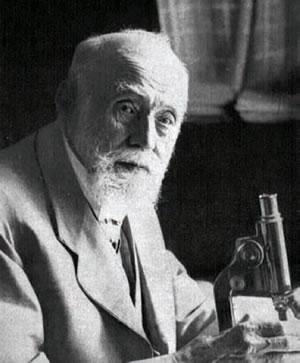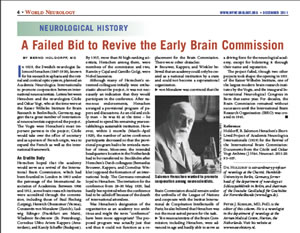Original article by By Bernd Holdorff, M.D. published 19 December 2011 in World Neurology Vol 26 No. 6, Neurological History
 |
Salomon Henschen wanted to promote cooperation among neuroscientists.
|
In 1929, the Swedish neurologist Salomon Henschen (1847-1930), known for his research in aphasia and the retinal and cortical optic system, planned an Academia Neurologica Internationalis to promote cooperation between international neuroscientists. Letters between Henschen and the neurologists Cécile and Oskar Vogt, who at the time were at the Kaiser Wilhelm Institute for Brain Research in Berlin-Buch, Germany, suggest that a great number of international neuroscientists supported the project. The Vogts were Henschen's most important partners in the project; Cécile would take over the office of secretary and as a person of French origin, was to expand the French as well as the international framework.
An Erudite Body
Henschen hoped that the academy would serve as a revival of the International Brain Commission, which had been founded in London in 1903 under the patronage of the International Association of Academies. Between 1906 and 1912, some brain research institutes were accredited through the commission, including those of Paul Flechsig (Leipzig), Heinrich Obersteiner (Vienna), Constantin von Monakow (Zurich), Ludwig Edinger (Frankfurt am Main), Wladimir Bechterew (St. Petersburg), Cornelius Ubbo Ariens Kappers (Amsterdam), and Karoly Schaffer (Budapest). By 1915, more than 50 high-ranking scientists, Henschen among them, were members of the commission and two, Ramón y Cajal and Camillo Golgi, were Nobel laureates.
Although many of Henschen's esteemed colleagues initially were enthusiastic about the project, it was not necessarily an indication that they would participate in the conference. After numerous endorsements, Henschen arranged a provisional program of papers and discussions. As an old and sickly man – he was 82 at the time – he planned to spend his remaining years establishing a sustainable institution. However, within 2 months (March–April 1929), the number of active conference participants decreased so that the provisional program had to be revised a number of times. Moreover, the intended headquarters location in the Netherlands had to be transferred to Stockholm after Henschen's Dutch colleagues (Bernardus Brouwer, Kappers, and Cornelius Winkler) opposed the formation of an international body. The Germans remained loyal to Henschen. The invitation for the conference from 28–30 May, 1929, had hardly been printed when the conference had to be called off because of the dearth of international attendees.
Was Henschen's designation of the organization as an academy too ambitious and might the term "conference" have been more appropriate? The proposed program was actually just that and thus it could not function as a replacement for the Brain Commission. There were other obstacles:
- Brouwer, Kappers, and Winkler believed that an academy could only be created as a national institution by a state and could not become a supranational organization.
- von Monakow was convinced that the Brain Commission should remain under the umbrella of the League of Nations and cooperate with the Institut International de Coopération Intellectuelle of Paris; he also believed that Henschen was not the most suited person for the task.
- Ten neuroscientists of the Brain Commission, including Henschen, were advanced in age and hardly able to serve as a driving force for the neurological academy, except for bolstering it through their name and reputation.
The project failed, though two other projects took shape: the opening in 1931 of the Kaiser Wilhelm Institute, one of the largest modern brain research institutes by the Vogts, and the inaugural International Neurological Congress in Bern that same year. For decades, the Brain Commission remained without successors until the International Brain Research Organization (IBRO) was created in 1961. ■
Reference
- Holdorff, B. Salomon Henschen's Short-Lived Project of Academia Neurologica Internationalis (1929) for the Revival of the International Brain Commission: Documents from the Cécile and Oskar Vogt Archives ( J. Hist. Neurosci. 2011:20: 93–105.
(At time of publication, December 2011) DR. HOLDORFF is extraordinary professor of neurology at the Charité, Humboldt- University in Berlin, Germany, former head of the department of neurology at Schlossparkklinik in Berlin, and chairman of the Deutsche Gesellschaft für Geschichte der Nervenheilkunde (www.dggn.de). PETER J. KOEHLER, MD, PHD, is the editor of this column. He is a neurologist in the department of neurology at the Atrium Medical Centre, Heerlen, the Netherlands. Visit his website at www.neurohistory.nl.








